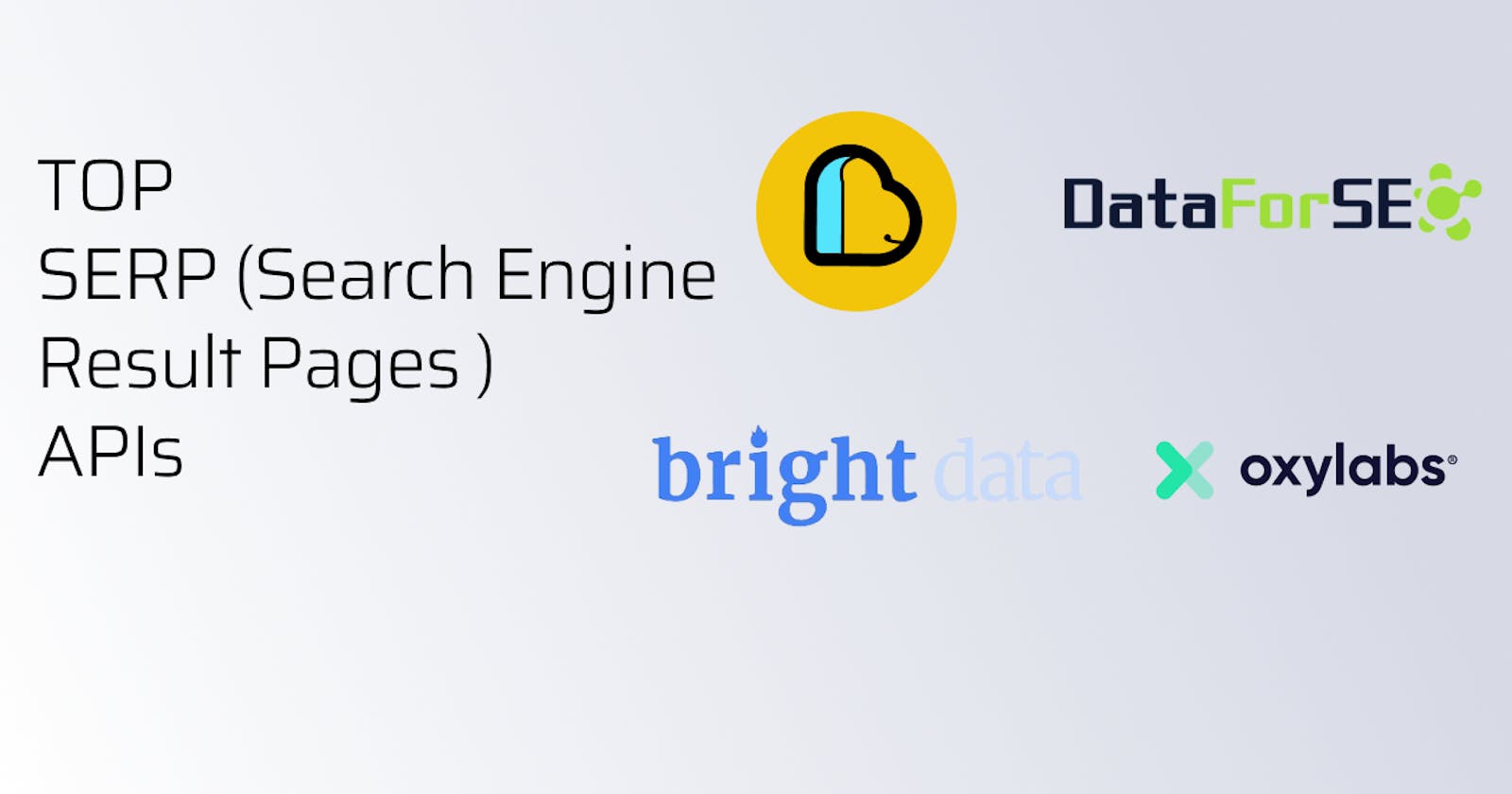Exploring the Top SERP (Search Engine Result Pages) APIs
In this blog, we will compare some of the most popular SERP APIs, looking at their functionalities, features and pricing.
Introduction:
Search Engine Results Page (SERP) is the list of websites that appear after a user enters a query into a search engine, such as Google. The SERP comprises webpages, images, videos, and other content relevant to the query.
The Search Engine Results Page is determined by algorithms that assess the relevance of webpages about any query, as well as other factors like page authority and content quality.
The SERP results can be broadly categorized into two categories:
Organic results: Organic means the results are those that appear naturally in the SERP and are not bought or sponsored by any company.
Paid results: Paid results are sponsored or bought by companies and typically appear at the top or bottom of the SERP.
For more information around SERP, you can read a previous blog that we wrote.
Features & Functionality
Search Engine Support:
ApyHub allows extracting SERP ranking for Google Search and upcoming support for DuckDuckGo, Bing, Yandex, and Baidu. Brightdata allows extracting SERP ranking for Google DuckDuckGo, Bing, Yandex, and Baidu. Similarly, DataforSEO allows extracting SERP rankings for Google, Yahoo, Bing, and Baidu. Oxylabs allows extracting SERP for Google, Bing, Baidu, and Yandex.
Localized Search Rankings:
ApyHub, Brightdata, and Oxylabs allow you to extract page rankings for specific locations and language. DataForSEO allows you to extract page ranking with some additional parameters including location, language, and device (Desktop and Mobile).
SDKs and Client Libraries
ApyHub allows you to generate client code in 11 languages C, C#, JavaScript, Go, NodeJS, Java, Kotlin, Python, Rust, Dart, and Ruby, and provides SDKs in JavaScript and Go. BrightData allows you to generate client code in 8 languages and includes NodeJS, Java, C#, PHP, Python, Ruby, and Perl. DataForSEO allows you to generate client code in 4 languages including NodeJS, Python, PHP, and C#. Oxylabs allows you to generate client code in 6 languages including Python, PHP, C#, Go, and NodeJS.

BrightData Client Code Generation Page
Documentation and Tutorials:
Apyhub APIs are supported with thorough documentation, including the Authentication method, Error Codes, HTTP Response Codes, and Request Examples. Brightdata provides very comprehensive documentation including a quick start guide and code examples.
DataForSEO and Oxylabs have provided documentation in the form of a guide that is easily understandable.

Documentation Page DataForSEO SERP APIs
API Testing:
Most of the providers let you test the APIs right from a terminal in the platform. Brightdata also provides an interactive API Playground for developers to test and check SERP Ranking for multiple search engines. ApyHub also has an API Playground where you can test the APIs in the UI plus you can see the snippet of the provided input in cURL. DataForSEO and Oxylabs don’t provide any internal tool for API tests but provide cURL request code to test on API Clients

ApyHub’s API Playground: Testing SERP Rank Checker API
Availability:
ApyHub has served *99.99% of uptime. BrightData, DataforSEO, and Oxylabs also claim to have high uptime.
Pricing:
This is subject to change but at the time of writing, all providers offer a subscription-based tiered model including a free plan. The most generous free plan is from ApyHub, offering 2 Million API calls per month for free. Oxylabs offers up to 5000 API Calls per month under a free plan. BrightData and DataForSEO don’t offer any free plan and allow you to consume API using pay-as-you-go.
Community Support:
Most of the providers offer dedicated channels such as Discord, Slack, or Chatbot Agent to their users to ask support questions. ApyHub has a dedicated Discord Server, which lets you interact directly with the support team in addition to email support. Brightdata offers plan-based support which includes email support a dedicated Slack channel and a Technical Account Manager. DataForSEO and Oxylabs provide chatbot agents and email support.
Below is a summary of the comparison of the providers I looked at.
| Provider | # Calls (Free) | Input parameters | Output Parameters | Pricing ( Paid ) | Throttling |
| ApyHub | Up to 2 Million API Calls / Month | Keyword, location, language | Type, rank, title, description, domain, link breadcrumb | Starting from 10 EUR/month | 1 call/s in the free plan |
| BrightData | No Free API calls. | Keyword, website, location, language | rank, title, description, link | Starting from 10 USD/month | N/A |
| DataForSEO | No Free API cal | Keyword, website, location, language, device | Type, rank, Absolute rank, title, domain description, link | No Monthly Subscription. Pay-as-you-go starts at 0.6 USD/ API call. | N/A |
| Oxylabs | Up to 5000 API Calls / Month | Keyword, website, location, language | Position, Position Overall, title, description, link | Starting from 49 USD/month | 5 call/s in the free plan |
Conclusion
When it comes to extracting SERP Ranking - ApyHub, BrightData, DataForSEO and Oxylabs all provide unique features and benefits for developers. Depending on the specific project requirements, developers can choose the API that best suits their needs.
With factors such as supported language, and location for keywords, developers can make a decision and leverage the most useful API to streamline their SERP extraction workflow from search engines.
Do you agree with our list of the above API Providers? What do you think is the best SERP Rank Extractor API? Let us know your thoughts in the comments below.
Disclaimer: This article is for informational purposes only. The opinions expressed are solely based on the research and may vary based on individual experiences and preferences.
